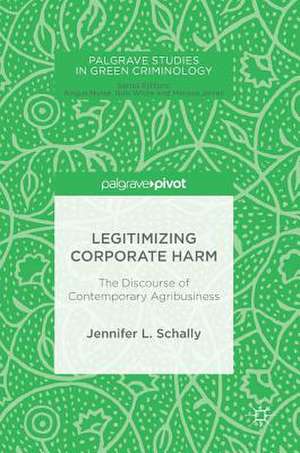Legitimizing Corporate Harm: The Discourse of Contemporary Agribusiness: Palgrave Studies in Green Criminology
Autor Jennifer L. Schallyen Limba Engleză Hardback – 7 dec 2017
This book utilizes critical discourse analysis to illuminate the ways in which one of the largest agribusinesses in operation, Tyson Foods, disguises their actions whilst simultaneously presenting the image of a benign, good corporate citizen. Schally unveils how the discourses employed by Tyson gain legitimacy by drawing on and aligning with larger cultural discourses that are often taken for granted and not adequately scrutinised. This original research, situated at the intersection of green and cultural criminologies, contributes to these current perspectives as well as to the burgeoning social harm approach within criminology.
A bold and engaging study, this book will be indispensable for students and scholars of green criminology, corporate crime, animals and society, and environmental sociology, as well as environmental and animal rights activists.
| Toate formatele și edițiile | Preț | Express |
|---|---|---|
| Paperback (1) | 376.80 lei 6-8 săpt. | |
| Springer International Publishing – 27 mai 2018 | 376.80 lei 6-8 săpt. | |
| Hardback (1) | 382.75 lei 6-8 săpt. | |
| Springer International Publishing – 7 dec 2017 | 382.75 lei 6-8 săpt. |
Din seria Palgrave Studies in Green Criminology
-
 Preț: 319.35 lei
Preț: 319.35 lei -
 Preț: 386.22 lei
Preț: 386.22 lei - 15%
 Preț: 642.18 lei
Preț: 642.18 lei - 18%
 Preț: 782.42 lei
Preț: 782.42 lei - 18%
 Preț: 891.48 lei
Preț: 891.48 lei - 18%
 Preț: 948.79 lei
Preț: 948.79 lei -
 Preț: 451.26 lei
Preț: 451.26 lei - 15%
 Preț: 645.96 lei
Preț: 645.96 lei - 15%
 Preț: 648.24 lei
Preț: 648.24 lei - 18%
 Preț: 894.79 lei
Preț: 894.79 lei - 18%
 Preț: 944.82 lei
Preț: 944.82 lei - 15%
 Preț: 577.72 lei
Preț: 577.72 lei - 15%
 Preț: 637.13 lei
Preț: 637.13 lei - 18%
 Preț: 888.49 lei
Preț: 888.49 lei - 18%
 Preț: 895.45 lei
Preț: 895.45 lei - 18%
 Preț: 724.00 lei
Preț: 724.00 lei - 18%
 Preț: 949.73 lei
Preț: 949.73 lei - 15%
 Preț: 696.82 lei
Preț: 696.82 lei - 18%
 Preț: 945.14 lei
Preț: 945.14 lei
Preț: 382.75 lei
Nou
Puncte Express: 574
Preț estimativ în valută:
73.26€ • 79.61$ • 61.58£
73.26€ • 79.61$ • 61.58£
Carte tipărită la comandă
Livrare economică 21 aprilie-05 mai
Preluare comenzi: 021 569.72.76
Specificații
ISBN-13: 9783319678788
ISBN-10: 3319678787
Pagini: 97
Ilustrații: XVII, 97 p.
Dimensiuni: 148 x 210 mm
Greutate: 0.29 kg
Ediția:1st ed. 2018
Editura: Springer International Publishing
Colecția Palgrave Macmillan
Seria Palgrave Studies in Green Criminology
Locul publicării:Cham, Switzerland
ISBN-10: 3319678787
Pagini: 97
Ilustrații: XVII, 97 p.
Dimensiuni: 148 x 210 mm
Greutate: 0.29 kg
Ediția:1st ed. 2018
Editura: Springer International Publishing
Colecția Palgrave Macmillan
Seria Palgrave Studies in Green Criminology
Locul publicării:Cham, Switzerland
Cuprins
Chapter 1. Introduction.- Chapter 2. Industrial Agriculture and its Harms.- Chapter 3. The Nature of Tyson’s Harms.- Chapter 4. Contextualizing the ‘Socially Responsible’ Corporation and the Cultural Legitimation of Harm.- Chapter 5. Disguising Harms: Talking and Not Talking About It.- Chapter 6. Being Good – or at Least Not Bad.- Chapter 7. Taking Stock, Taking Action.- Appendix: Research Methods or How I Digested What Tyson Was Serving Up.
Notă biografică
Jennifer L. Schally is on the faculty of the School of Public Affairs at Penn State Harrisburg, USA.
Textul de pe ultima copertă
This book utilizes critical discourse analysis to illuminate the ways in which one of the largest agribusinesses in operation, Tyson Foods, disguises their actions whilst simultaneously presenting the image of a benign, good corporate citizen. Schally unveils how the discourses employed by Tyson gain legitimacy by drawing on and aligning with larger cultural discourses that are often taken for granted and not adequately scrutinised. This original research, situated at the intersection of green and cultural criminologies, contributes to these current perspectives as well as to the burgeoning social harm approach within criminology.
A bold and engaging study, this book will be indispensable for students and scholars of green criminology, corporate crime, animals and society, and environmental sociology, as well as environmental and animal rights activists.
Caracteristici
Uniquely targets animal and environmental harm caused by the industrial food system Sheds light on the role of language and other symbols in the perpetuation of harm to non-human life Highlights the failure of industrial agriculture to protect animals
